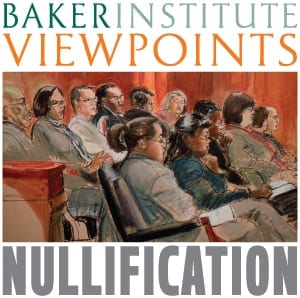Jury nullification — when a jury disagrees with the law and acquits a defendant they believe to be guilty — has a long history in the United States of serving as a bellwether for social change on unpopular laws. There are numerous historical examples of juries nullifying laws that would later change due to vast public opposition. More recently, legal professionals have identified jury nullification verdicts in marijuana cases. This should not be surprising given society’s rapidly changing view of marijuana — support for legalization now polls at 58 percent nationally, and in Texas it polls equally well. In this installment of Baker Institute Viewpoints, experts discuss the question, “What does jury nullification of marijuana cases in Texas indicate about the possibility of marijuana legalization?”
Read other posts in this series:
- Can jurors hasten the legalization of cannabis? by Clay S. Conrad, an attorney and author of “Jury Nullification: The Evolution of a Doctrine”
- Ceasefire in the war on marijuana in Texas? Trial by jury and jury nullification by Gilbert G. Garcia, a board-certified criminal lawyer
- Prioritizing public safety over applying outdated drug policy by Rehman Bhalesha, research assistant at South Texas College of Law
Jury nullification occurs when a jury refuses to convict a defendant they know has broken the law — perhaps because they dislike the law or believe the probable punishment is too harsh, or maybe just because of strong positive or negative feelings about the defendant or the victim.
Given widespread criticism of current U.S. drug policy — with penalties often far harsher than any harm done by the drug or the user, and race or social class often the best predictor of who will be arrested, convicted and punished — it is not surprising that jury nullification, though still rare, appears to be on the rise in drug cases that reach the trial stage. But even if the numbers remain small, their impact can ripple outward.
In recent years, several people who know of my interest in drug policy have told me how serving on a grand jury opened their eyes and changed their minds about our drug laws, particularly those dealing with marijuana or with tiny amounts of harder drugs. The stories have been essentially identical: “When I agreed to serve, I was ready to come down hard on people who used any illegal drug. But after spending so much of our time, day after day, hearing prosecutors ask us to true-bill people arrested just for possessing small amounts of marijuana or finding out that someone caught with a microscopic amount of crack cocaine might spend years in prison at taxpayer expense, I think everybody on that grand jury felt like we need to take a hard look at what we’ve been doing.”
At least some of the time, these jurors express their feelings to the judge who appoints them. Michael McSpadden, judge of the 209th District Court, recalled “getting it from the jurors, especially from the grand juries who see these cases coming before them every single day. A guy walking on the ‘wrong side’ of the road, getting stopped, then frisked, then getting pulled in and getting a felony for having residue on a pipe. They’d ask, ‘Don’t they have something better to do?’”
Since most people never get the cumulative effect provided by service on a grand jury, McSpadden decided years ago to try to find out what ordinary jurors were thinking. “We had several cases involving 200 or 300 hundred pounds of marijuana, and I wanted to see what the public felt to help us decide what an appropriate plea-bargain agreement should be. So I said, ‘Let’s go ahead and try it. See what a jury wants.’ In the first case, they found the defendant guilty and gave him probation. At that time, less than one gram of cocaine would have brought two years without any prior convictions. We did another one just to see. Same result — huge amount of marijuana, probation. The prosecutors couldn’t believe it.”
As a result of such experience, McSpadden has spoken publicly of his openness to some form of marijuana legalization and has repeatedly led many of his fellow Harris County judges in urging the Texas Legislature to reduce the status of delivery or possession of small amounts of cocaine and other harder drugs from a felony to some level of misdemeanor that could involve jail time, but might require no more than a fine of $500. In a letter to Sen. John Whitmire, the longtime chair of the Senate Committee on Criminal Justice, McSpadden wrote that such changes “would result in enormous savings to taxpayers by freeing up substantial numbers of jail beds and court resources that could be used to address more serious crimes.” These changes “would be fair, just and have an immediate positive effect on our overtaxed criminal justice system.”
Many factors, including a strong sense of fairness, have influenced McSpadden’s evolution into a prominent judicial voice of drug policy reform, but he readily acknowledges the role played by juries — grand and petit — that repeatedly questioned what the law seemed to require of them and sometimes said “no.”
 William Martin, Ph.D., is the Harry and Hazel Chavanne Senior Fellow in Religion and Public Policy at the Baker Institute and the Chavanne Emeritus Professor of Sociology at Rice University. He also directs the institute’s Drug Policy Program. His articles have appeared in such publications as Texas Monthly, The Atlantic Monthly and Harper’s, as well as in professional journals. He received his Ph.D. from Harvard University in 1969.
William Martin, Ph.D., is the Harry and Hazel Chavanne Senior Fellow in Religion and Public Policy at the Baker Institute and the Chavanne Emeritus Professor of Sociology at Rice University. He also directs the institute’s Drug Policy Program. His articles have appeared in such publications as Texas Monthly, The Atlantic Monthly and Harper’s, as well as in professional journals. He received his Ph.D. from Harvard University in 1969.
